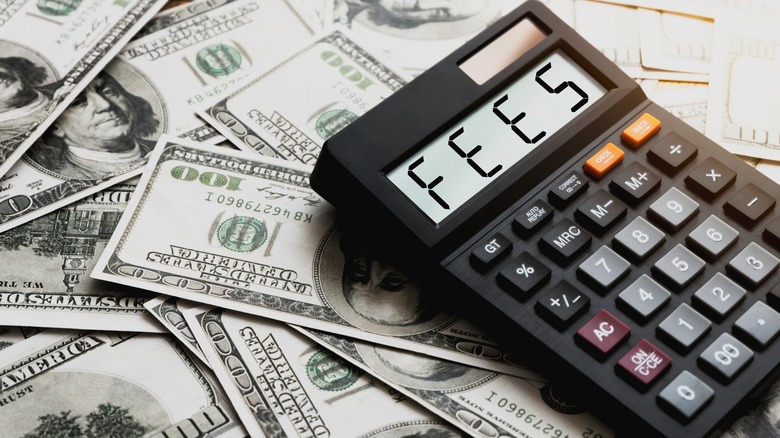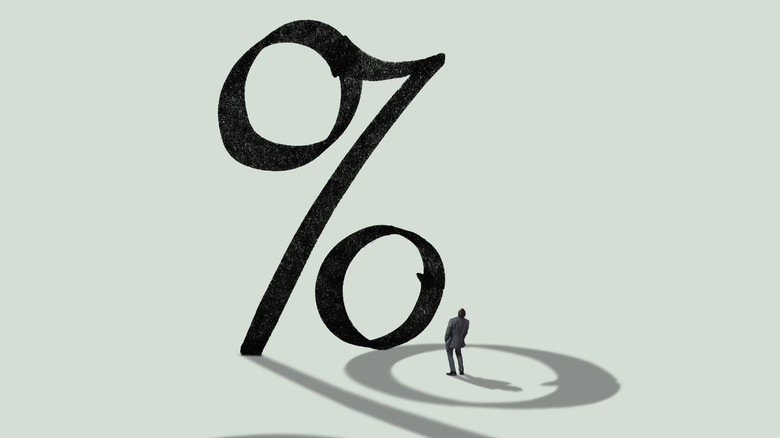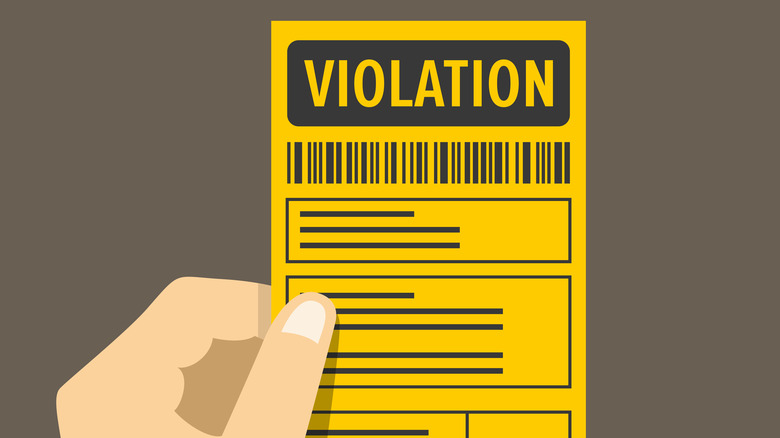Red Flags You Should Look For When Choosing A Credit Card
Finding a new credit card is an important step for anyone looking to continue cultivating their credit score. Opening up a new line of credit can help boost your score over the long term, and provide a means of accumulating some valuable rewards for use on a more medium-length timeline. Travel rewards cards, for instance, might provide you with enough points to enjoy a free flight or hotel room every year.
There are a lot of great benefits that responsible credit card use can bring into your financial life. However, plenty of problems lay in wait for those who haven't fully understood the terms of the agreement or who jumped at the first opportunity that came their way. Avoiding potentially problematic credit cards is just as important as opening an account that can benefit you and your credit report. Fortunately, there are some common red flags that consumers can look for when shopping around for a new piece of plastic. These might not initially be obvious, but once you see them you can't unsee the pitfalls that may lie ahead. Avoiding credit cards and card companies that exhibit these behaviors is the best way to start your credit journey off on the right foot (or continue managing it effectively).
Read customer reviews and avoid companies with a poor reputation
The first step that all consumers should take when thinking about a new credit card is to read reviews. Reviews help keep companies honest. Often, people are more likely to leave a review if they've had a bad experience than a good one, but this step will help guide you in the right direction when seeking to avoid particularly poor brands. One aspect of the credit card experience is all too often overlooked when people begin shopping around for a new spending option. While interest rates and credit limits are some of the most important features in this decision, the company itself can make or break efficient use of the account.
Consumers today often have to face off against credit card fraud, refund issues from merchants, and even the need to lock or unlock their cards for use when traveling or under other circumstances. These elements of the user experience rely completely on the company that issued the card and manages the account. Reading reviews will help you gauge a card issuer's willingness to work with customers when it matters most to them. If you find a large volume of negative reviews relating to these kinds of customer interactions, it might be wise to look elsewhere before you make your decision.
Look out for account maintenance fees and other non-typical add-ons
Many credit cards include fees for certain types of transactions or use cases. You may have a card that charges international currency conversion fees when spending abroad, or your card might charge annual fees for maintaining an open account. These might not matter under certain circumstances, but carefully reading the fine print in order to understand all of the charges that you may be on the hook for is important. A credit card that charges maintenance fees or other non-typical expenses might be one to avoid.
There are scores of companies out there that manage credit cards for consumers. It's entirely possible to find a card that doesn't charge any added expenses, therefore there's no reason to pay for something that you don't have to. Any type of service fee or maintenance charge is likely one that you can avoid by simply looking elsewhere. Similarly, in the same way that rewards cards often provide cash back or other points in a variety of categories, fees associated with certain types of spending may or may not matter to you. If you never travel out of the country, foreign transaction fees are irrelevant to your usage. But for someone who might consider using a cash advance or balance transfer, high margins on these types of activities can be a solid turn-off. Instead, opt for one that doesn't tack on these additional charges.
Wildly high APRs are a no-go
The average interest rate on credit cards in January 2024 is 27.79%. This is very high, to be sure. As a result, credit card users will want to leverage their credit limit sparingly to avoid being assessed interest on their regular purchases. Paying off your credit card in full every month is the best way to use these accounts, bar none. But, if you are going to be charged interest resulting from a carried balance — which 65% of people experience— then finding a card with the lowest possible interest rate is extremely important. An outrageously high-interest rate can quickly add up to gigantic additional expenses that erode your financial mobility and future. Succumbing to high interest is sadly all too common, and many people struggle with managing their credit card bills as a result. One important step you could take when working to reverse these effects is a strategy of selectivity when opening any new credit card account.
It's worthwhile to prioritize paying down existing cards in the build-up to your applications. This will raise your credit score and allow you to enjoy improved offers. However, no matter what your score is, opening a new credit card with a ridiculously high interest rate is likely a bad idea. It's good practice to hold out until you find one that provides the specifics you need without the threat of financial ruin if you can't consistently repay the bill in full.
Avoid extremely low credit limits
Perhaps a somewhat surprising red flag, but an important one to keep an eye out for nonetheless, is the low credit limit offer. This is particularly important for those just starting their credit journey. A low credit limit has the potential to severely impact your credit score in a negative and unrelenting way.
For a first-time credit card user, a single, low credit limit will do horrible things to your utilization ratio. This remains a factor for those with more established credit, but it isn't nearly the same weighty problem. When successfully opening your first credit card, you might be given a limit of $1,000, for instance. One $100 purchase will immediately jump your utilization rate to 10%, Whereas a $100 purchase on a $10,000 total limit only moves the needle by 1%. Both total utilization and individual rates matter when computing your credit score, so this remains at least a potential sticking point, regardless of your credit mix. This effect can be counterbalanced with smart spending habits, but it requires a bit more planning than might normally be the case.
Be wary of sky high limits, too
Conversely, very high credit limits are also a red flag that shoppers should be wary of. A high credit limit isn't necessarily an issue on its own, but a massive total spend limit can be an enticing feature for someone new to the use of credit cards or an individual with a prior penchant for overspending on existing cards.
A high credit limit has the potential to add significantly to your total debt and in a major hurry. Irresponsible spending is something that affects credit card users far more often than might be expected. The ability to overspend is a strong incentive to do just that. Credit card companies may not be maliciously trying to take advantage of their users, but the fact remains that a high credit limit offer is often met with far more spending than a user might commit to without this added impetus. Getting into more debt than you can handle only serves to boost the profits of the card company. If you are offered a very large credit limit when applying for new cards, it's important to remember that this can significantly boost your credit score by adding to your total credit limit and dramatically reducing your utilization figure. But these effects can only take effect if you manage the new limit responsibly, and not just in the few months that follow the account's opening.
Shy away from a secured card that can't be upgraded
A secured credit card is a valuable tool for those recovering from bankruptcy or foreclosure, and it can be an equally valuable asset for a first-time credit user looking to start on the right foot. The difference between a secured credit card and a regular account is that a secured card is "secured" by a deposit equal to the account's credit limit. As a result, every month when you pay your bill, you're paying back into a fund that supports your spending rather than repaying a financial institution that has lent you capital.
A secured card can be valuable, but it isn't likely to be an account that you use for very long. Once you've built a consistent history of repayments and responsible usage, shifting to a traditional credit card that provides a more standard experience and perhaps even an attached rewards program is an important next step. Even so, it's important to remember that closing a credit card account can have negative effects on your credit score. For one thing, if you're using a secured card then there's a chance it was your first credit account. This means that closing it will close your oldest account, a big no-no when it comes to responsible credit management. Instead, opening a secured account that allows you to upgrade the card to a traditional one in the future will prevent you from having to close it to get your deposit returned.
Air on the side of caution if you've received tons of mail offers from a card issuer
Credit card users across the board will be familiar with the tactic of unsolicited mail and email offers that credit card companies deploy to try to sign up new users. You may be intimately familiar with pre-approval offers and invitations to apply for new lines of credit or personal loans. But many companies send these out somewhat sparingly. You may see a new offer once a year or perhaps even every six months. However, if you're getting regular correspondence about signing up for a new card from the same company with relentless fervor, it's worth taking a step back before considering the offer.
An overzealous approach is a common tactic used by less-than-stellar credit card companies. They are looking to sign-up users and aren't typically picky about who that might be. As a result, these companies may sport a customer service record that's wanting, and the cards they offer may not come with the same value in terms of perks and rewards options that more reputable brands might provide. A pre-approval letter here and there can be a helping hand, but incessant nagging to sign you up for a new car is a surefire red flag signaling that you might want to steer clear.
Only pay an annual fee if you're getting something valuable for it
Travel rewards cards and other high-value accounts often come with an annual fee attached. Depending on the types of perks and sometimes other factors like the proposed credit limit or even the credit score required for qualification, these fees can range from a small cost to something far more substantial. However, there's a common thread that users must keep in mind when considering a credit card that comes with an annual fee.
An annual fee associated with the card that provides no perks is an immediate red flag and should act as a dramatic warning to stay far away from the card and perhaps even the card issuer altogether. There's no reason to pay an annual fee that provides you with no benefit whatsoever. As well, a straightforward cash-back card likely doesn't offer enough value to warrant this additional charge. For reference, the typical cash-back credit card returns an average of around $278 over a year. So this figure might act as a baseline to determine whether a cash-back card carrying a fee might be warranted concerning your personal circumstances. The reality is that there are plenty of great credit cards out there to charge no annual fee at all, so avoiding one that costs you extra money for no reason isn't all that difficult.
Avoid penalty rates and other punishment clauses
Users will want to avoid late fees on missed payments, and other poor credit management habits and consequences. This isn't unique to cardholders with high APRs or other specific terms in their card member agreement. However, some credit card companies include penalty language in their contracts. If you are late on a payment, you may be subjected to a penalty APR. This could see your interest rate skyrocket for a penalty period that may last a few months for a year, or perhaps even indefinitely.
Not every credit card issuer will include penalties like this. Therefore, it's important to read the fine print in order to understand both your responsibilities while using the card and any consequences that may come your way if you manage the account improperly. While a late payment won't necessarily jeopardize the hard work you put in to cultivate a high credit score, there may be other consequences associated with your card that make this a major issue going forward.
Pass on cards that allow rewards points to expire
Another piece of information that you'll find in the fine print is whether or not cash back or other accrued reward points will expire. In today's day and age, there's no reason to use a credit card that places a time limit on your use of accumulated rewards. Companies have been including language recently that requires you to reach preset thresholds to cash in points, this isn't great news for card users. However, expiration terms are simply unacceptable given the vast marketplace of credit card companies in competition with one another. This is a red flag in the boldest of terms. Offering great rewards upfront and then taking them away if you don't use them the way your card issuer wants is disingenuous at best and highway robbery at worst.
Instead, anyone shopping around for a new credit card will want to look for options that not only don't have expiration dates attached to their points balance but also provide for a robust marketplace of transfers and redemption options. Transferring points from one type to another can make for a variety of bonuses. This particular feature is great for travelers looking to combine airline, hotel, and credit card reward points for the best possible landscape of upgrades, discounts, and freebies.
Say no to cards that have no rewards programs attached to spending
In the same way expiration dates should be a massive turn-off for credit card users, a card that offers no rewards program at all shouldn't even be on your radar. These kinds of cards only serve people who are establishing credit for the first time. And even then, rewards cards may often still be on the table, eliminating the utility of a straight credit line.
A card with no rewards program does not provide much incentive to use. With a rich marketplace of options out there, you're unlikely to need to fall back on this type of card. As a result, avoiding cards with no rewards programs isn't typically difficult. However, it remains important to think carefully before closing an account like this if you already have a card with no spending incentives. This is especially true for those who have maintained the perk-less card for many years.
Don't use store credit cards wherever possible
Store credit might seem like a great idea as you browse for new purchases. It can be particularly attractive when buying expensive goods like a new computer, furniture, or appliances. However, store credit cards aren't typically organized in the same way as an actual credit card agreement. Instead, they function along the lines of a lending agreement governing specific purchases. You may be able to use the credit line again at the store, but this isn't typically what these credit products are aimed at providing. Instead, the usual application is to spread the cost of a large purchase over a more convenient time frame, often with the incentive of interest-free payments.
However, anyone using store credit products will need to remain vigilant when calculating repayments. These lending agreements often require buyers to pay down the entire balance before the offer term expires. But if it isn't repaid by this deadline buyers are saddled with all of the back interest that would have been accruing. To make matters worse, store credit products like this tend to carry even higher interest rates than traditional credit cards. This figure doesn't seem like an issue because buyers expect to pay off the balance without interest factoring into the equation. But if use this product and don't pay off the balance promptly you can expect a serious shock when all that interest is added back into your bill.












